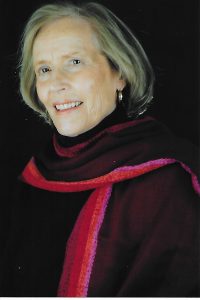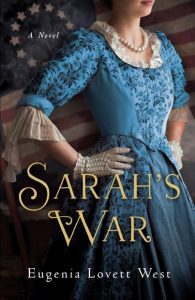Writing At Ninety Six
 It’s never too late to create and publish. At age 96, I wake up every morning and look forward to sitting down at the computer and producing. I grew up in Boston, MA and New Haven, CT. Studied at Sarah Lawrence College, worked briefly at Harper’s Bazaar, then married a dashing fighter pilot in the 8th Air Force. We had four children, four grandchildren, and stayed married for sixty years.
It’s never too late to create and publish. At age 96, I wake up every morning and look forward to sitting down at the computer and producing. I grew up in Boston, MA and New Haven, CT. Studied at Sarah Lawrence College, worked briefly at Harper’s Bazaar, then married a dashing fighter pilot in the 8th Air Force. We had four children, four grandchildren, and stayed married for sixty years.
People often ask writers if they always wanted to write. I was a reader who liked playing with words, but the serious urge took hold when my youngest child was in school all day and I became a freelance reporter for local newspapers. Feeling important, I rushed around with a Nikon camera covering everything from sewage disposal meetings to national politics. Then, instead of 300 words, why not 300 pages?
The first novel was sheer trash. The second try was historical/suspense set in a sugar plantation in Jamaica in 1870’s. Big excitement when Mom’s little hobby was picked up and published by Doubleday and Ballantine. At last it was legitimate to write Author in those blanks that ask for your occupation.
With hindsight, I probably should have stuck to one genre, but I loved mysteries, especially PD James and the Golden Age writers like Dorothy Sayers. My first mystery was self-published for family and friends. They liked it, so I entered a contest sponsored by St. Martin’s Press. Months passed, but one fine morning I opened my computer and nearly levitated out of my chair. The renowned Ruth Cavin, at 90 the grande dame of mystery editors, was offering me a contract for two books. Believe me, it doesn’t get better than this. Without Warning was published in 2007and Overkill in 2009. The third in the Emma Streat mystery series is coming out next November—and this time Emma is plunged into cybercrime and juggling problems with men.
But for years another historical novel was sitting on the back burner, triggered by the winter of 1777 in the American Revolution when George Washington and his sick, starving, militia struggled to survive at Valley Forge. At the same time, high-living British officers were enjoying winter quarters in Philadelphia. There were balls, musicales, and theatricals, events that turned the heads of Loyalist girls like Peggy Shippen.
The climax was the farewell party for General Sir Wiilliam Howe. It cost his officers several thousand pounds and featured a tournament with jousting knights on horses, a grand dinner, and fireworks. The contrast was startling, and I started to do extensive research. After spending four days reliving the battle at Brandywine River, I knew where every regiment in both armies was standing, how the British general Lord Cornwallis made a fearful mistake in letting his troops fall out for lunch, giving Washington’s men a chance to escape.
But—I ended up making drastic cuts to the final version of Sarah’s War. The plot now revolves around this young beauty and her year of spying and heartbreak. The aim is to give the reader a strong sense of what it was like to live in that dangerous time when Loyalists outnumbered patriots and the streets were filled with informers. Frankly. I had no idea how close we came to losing the war, and how much we owe to those who sacrificed to form a democracy that must be preserved.
Writers are often asked about the process of creating a book. I say it’s 10% talent and 90% applying the seat of the pants to the seat of the chair. In a way, it’s like making a big stew. You put in the ingredients. stir, hope for a good result, but it takes time and a lot of trial and error to find one’s voice and one’s style. I tend to end up with strong women working their way through disasters in interesting settings. Emma Streat does a lot of traveling to different countries, ones I visited on business trips with my husband.
For historical novels, it can be a challenge to balance facts with imagination. For Jamaica, it was enough to read a few journals mostly written by English governor’s wives. For American history, beware any mistakes—they’re sure to be found. On the other hand, the mystery genre requires sly red herrings, judiciously scattered clues, a surprise ending, and justice must always triumph.
As for process, I bypass domestic violence. My subplots must have a global theme like advanced weapons, lethal viruses, cybercrime. I start with a general idea and let pictures run through my mind, like watching a movie. In the end it all comes down to telling a story that entertains or informs or both. One might say that being a writer is like living in two worlds—one is where you eat, sleep, and talk. The other is where you exist with a different set of people —and I get to know them better than my own children. They are on a journey and must be guided to their destination.
As a woman writer, I believe deeply in the value of escape reading. For me, it started when I had little children clinging to my ankles. Nap time was a chance to read and regain sanity, and these days the need for immersion into other worlds may be more compelling than ever.
What is it like to be 96? My answer is that every day is a gift—and my wish for younger women is to find the strength to live their lives with kindness and with courage.
—
 Eugenia Lovett West isn’t your average 96-year-old; she’s releasing her fourth book, Sarah’s War a smart and page-turning historical fiction novel, this April. Fans of Susan Holloway Scott, Alex Myers, and Nancy E. Turner will love following Sarah through 1777 as she bravely participates in the efforts to form an independent country by spying on British officers and braving a visit to Valley Forge with information about a plot to kill Washington during the Revolutionary War.
Eugenia Lovett West isn’t your average 96-year-old; she’s releasing her fourth book, Sarah’s War a smart and page-turning historical fiction novel, this April. Fans of Susan Holloway Scott, Alex Myers, and Nancy E. Turner will love following Sarah through 1777 as she bravely participates in the efforts to form an independent country by spying on British officers and braving a visit to Valley Forge with information about a plot to kill Washington during the Revolutionary War.
“West provides excellent ingredients in this well-told historical novel, including scheming, flirting, romance, and villainy. There is also some fine period detail that helps to set the scene…An entertaining blend of intrigue and romance…”― Kirkus Reviews
Category: Contemporary Women Writers, How To and Tips

























I am so inspired by women writers who are older than me who started their career a little later than many. At 62, I always battle self doubt produced by that number pretending to be my age. I have not completed a manuscript yet, but my day will come. Thank you for the motivation to finish.
How inspiring! I worry that I might not have be able to write all the books I’d like to due to reaching retirement age. (I’ve published four and I’ve almost reached “The End” of the fifth novel in a traditional mystery series.) I’d love to think I could still be writing a quarter century from now!
Many thanks for sharing your story!
What an inspiration! I’m 75 and in the process of self-publishing a novella and a collection of short stories… lots of learning involved, and not for the faint of heart, but it gets me out of bed every morning with something productive to look forward to. Looking forward to reading your work.
Awesome article. I know a woman who is 84 and still writing and publishing. My neighbors are in their 80s are still regularly traveling all over the world. My father-in-law didn’t even begin to slow his pace of life until 93. Age doesn’t need to be a barrier to whatever we wish to do.
I really enjoyed your article. It brought tears to my eyes. You are truly an inspiration. I just turned 60 and sometimes feel overwhelmed with planning my first novel. This gives me encouragement to keep trying. I must read your book. I am writing a historical mystery so I love historicals. Thank you.